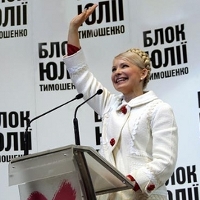Quo Vadis? Reaction to the Tymoshenko Verdict
October 17, 2011 -
Andrew Wilson
-
Bez kategorii

tymoszenko01_Minirobot_s.jpg
On October 11 Yulia Tymoshenko, the former Prime Minister of Ukraine, was sentenced to seven years in prison, fined a staggering $190 million and banned from holding state office for three years – all for signing a gas agreement with Russia in 2009. This is an awful mess. As it is entirely of the Ukrainians’ own making, schadenfreude is tempting. But the consequences could be severe if the EU-Ukraine agreements are thrown completely off track. Lithuanian Foreign Minister Audronius Ažubalis has claimed, and only a little hyperbolically, that “our decision about the Association Agreement could change European geopolitics for decades to come”.
The fault for once is not discordance on the EU side. The Ukrainian authorities received a clear and consistent message throughout September from both the EU and the US condemning the whole process, and the Yanukovych administration was signalling compromise. This may still come, but the Ukrainians are at the least guilty of inept timing and worse communication. By the time an appeal is heard or the ‘decriminalisation’ process completed [1], the damage may have become irreparable.
Part of the problem is that both sides were forced to maintain the pretence that this was a purely judicial process. It was therefore difficult to define any compromise in public and possible escape scenarios were left vague. In fact, the EU could still make it clearer that the row is not just about Tymoshenko’s freedom, but also about her freedom to participate in the 2012 elections. Without the Party of Regions main opponent, the vote will be meaningless and Ukraine will be in danger of becoming a “managed democracy”. Serhii Tihipko’s “Strong Ukraine” party has already accepted a shotgun marriage with Regions, and Kyiv’s “political technologists” are eying up candidates for a “loyal opposition”.
The need to act is clear for once. Nevertheless, there are two topics of residual debate. Should the red line mean dropping or freezing the Association Agreement and/or DCFTA now, or passing the buck to the several EU member states who will no doubt fail to ratify them after December? And in a broader strategic perspective, what is the best way of transforming Ukraine: a rebuff that might force a rethink in the short-term, or locking it into the transformation processes the agreements will hopefully create in the long-term?
Time is short before the scheduled EU-Ukraine summit in December. It would be entirely characteristic of the Yanukovych team to still be stringing out the process when the summit falls due. A final appeal could still be in the offing; parliament may have failed to consider decriminalisation for “technical reasons” (the necessary changes have already been blocked once on October 5). So unless a compromise magically appears as soon as possible, a decision to keep the agreement process on track until December may mean that the EU may simply have to make the decision on summit eve.
Far better to take other options now, while keeping the process only technically alive. The Ukrainians are perfectly capable of making swift decisions, if incentivised to do so, such as allowing a quick appeal under a changed law or making decriminalisation retrospective.
Yanukovych’s proposed visit to Brussels to meet Barroso on 20 October should be postponed. The bizarre Ukrainian push to include wording on a membership perspective in the agreements should be clearly rebuffed as an obvious attempt at sabotage and finding someone else to blame if the process collapses. A clear message should be sent about the dangers of simply charging Tymoshenko with something else.
The strategic question is more subtle. Removing political obstacles to economic and social change is indeed the priority, but it is far from clear that the politics would improve if the EU gifted Ukraine an agreement on strategic grounds. The idea that technocratic change takes the lead and politics follows has been buried deep in the EU’s Schuman-ist psychology since the 1950s; but in this case is far too long-term a perspective. Short-term politics are what matters when they are so badly wrong.
Nor should Brussels fall for the line that Ukraine will be “lost” to Russia if it is temporarily held at arm’s length by the EU. First, because this is a blackmail strategy deliberately deployed by the Yanukovych regime, which it learnt from Lukashenka. Second, because an isolated Ukraine is more likely than a Russia-allied Ukraine. Third, because unless the EU concentrates on its own bilateral relationship with Ukraine, it will never get it right.
Tough must mean tough. Otherwise, the entire credibility of the revamped Eastern Partnership will be lost. It will be impossible to devise a workable policy for Belarus. And any EU criticism of Putin as Russian President Restored after 2012 will be fatally undermined.
Andrew Wilson is a Senior Policy Fellow with the European Council on Foreign Relations (ECFR). His latest book Belarus: The Last European Dictatorship is available on October 31, 2011.
—
[1] The ‘decriminalisation’ compromise involves changing the Criminal Code so that Article 365 under which Tymoshenko was charged (abuse of public office) would no longer define a criminal offence or carry the threat of imprisonment, or be otherwise rewritten.
This week in the East is a weekly commentary by Andrew Wilson for New Eastern Europe.


































